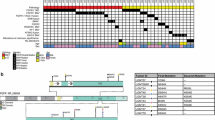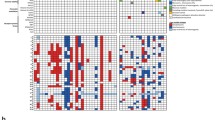Abstract
Recent studies of genetic abnormalities in pediatric low-grade gliomas (LGGs) have focused on activation of the ERK/MAPK pathway by KIAA1549-BRAF gene fusions in the majority of pilocytic astrocytomas (PAs) and by rare mutations in elements of the pathway across histopathologically diverse LGGs. This study reports that MYB, an oncogene not previously implicated in gliomagenesis, is activated in a diverse subset of pediatric LGGs. The study cohort comprised 57 pediatric LGGs and a comparative cohort of 59 pediatric high-grade gliomas (HGGs). The LGG cohort included 34 PAs and 23 diffuse gliomas; fibrillary astrocytomas (n = 14), oligodendroglial tumors (n = 7), and angiocentric gliomas (n = 2). MYB copy number abnormalities were disclosed using Affymetrix 6.0 SNP arrays and confirmed using interphase fluorescence in situ hybridization. Novel MYB amplifications that upregulate MYB RNA and protein expression were demonstrated in 2/14 diffuse astrocytomas. In addition, focal deletion of the terminal region of MYB was seen in 1 of 2 angiocentric gliomas (AGs). Increased expression of MYB was demonstrated by quantitative RT-PCR and immunohistochemistry. MYB upregulation at the protein level was demonstrated in a proportion of diffuse LGGs (60%), pilocytic astrocytomas (41%), and HGGs (19%), but abnormalities at the genomic level were only a feature of diffuse gliomas. Our data suggest that MYB may have a role in a subset of pediatric gliomas, through a variety of mechanisms in addition to MYB amplification and deletion.



Similar content being viewed by others
References
Arora RS, Alston RD, Eden TO et al (2009) Age-incidence patterns of primary CNS tumors in children, adolescents, and adults in England. Neuro Oncol 11:403–413
Balss J, Meyer J, Mueller W et al (2008) Analysis of the IDH1 codon 132 mutation in brain tumors. Acta Neuropathol 116:597–602
Bender TP, Kremer CS, Kraus M, Buch T, Rajewsky K (2004) Critical functions for c-Myb at three checkpoints during thymocyte development. Nat Immunol 5:721–729
Beroukhim R, Getz G, Nghiemphu L et al (2007) Assessing the significance of chromosomal aberrations in cancer: methodology and application to glioma. Proc Natl Acad Sci USA 104:20007–20012
Beug H, von Kirchbach A, Doderlein G, Conscience JF, Graf T (1979) Chicken hematopoietic cells transformed by seven strains of defective avian leukemia viruses display three distinct phenotypes of differentiation. Cell 18:375–390
Biedenkapp H, Borgmeyer U, Sippel AE, Klempnauer KH (1988) Viral myb oncogene encodes a sequence-specific DNA-binding activity. Nature 335:835–837
Broniscer A, Baker SJ, West AN et al (2007) Clinical and molecular characteristics of malignant transformation of low-grade glioma in children. J Clin Oncol 25:682–689
Chung EY, Dews M, Cozma D et al (2008) c-Myb oncoprotein is an essential target of the dleu2 tumor suppressor microRNA cluster. Cancer Biol Ther 7:1758–1764
Clappier E, Cuccuini W, Kalota A et al (2007) The C-MYB locus is involved in chromosomal translocation and genomic duplications in human T-cell acute leukemia (T-ALL), the translocation defining a new T-ALL subtype in very young children. Blood 110:1251–1261
Close J, Game L, Clark B et al (2004) Genome annotation of a 1.5 Mb region of human chromosome 6q23 encompassing a quantitative trait locus for fetal hemoglobin expression in adults. BMC Genomics 5:33. doi:10.1186/1471-2164-5-33
De Carli E, Wang X, Puget S (2009) IDH1 and IDH2 mutations in gliomas. N Engl J Med 360:2248 (author reply pp 2249)
Dougherty MJ, Santi M, Brose MS et al (2010) Activating mutations in BRAF characterize a spectrum of pediatric low-grade gliomas. Neuro Oncol. doi:10.1093/neuonc/noq007
Forshew T, Tatevossian RG, Lawson AR et al (2009) Activation of the ERK/MAPK pathway: a signature genetic defect in posterior fossa pilocytic astrocytomas. J Pathol 218:172–181
Fouladi M, Hunt DL, Pollack IF et al (2003) Outcome of children with centrally reviewed low-grade gliomas treated with chemotherapy with or without radiotherapy on Children’s Cancer Group high-grade glioma study CCG-945. Cancer 98:1243–1252
Fuller CE, Perry A (2005) Molecular diagnostics in central nervous system tumors. Adv Anat Pathol 12:180–194
Geraci M, Birch JM, Alston RD, Moran A, Eden TO (2007) Cancer mortality in 13 to 29-year-olds in England and Wales, 1981–2005. Br J Cancer 97:1588–1594
Grovas A, Fremgen A, Rauck A et al (1997) The National Cancer Data Base report on patterns of childhood cancers in the United States. Cancer 80:2321–2332
Horbinski C, Hamilton RL, Nikiforov Y, Pollack IF (2010) Association of molecular alterations, including BRAF, with biology and outcome in pilocytic astrocytomas. Acta Neuropathol 119:641–649
Huang AM, Rehm EJ, Rubin GM (2009) Recovery of DNA sequences flanking P-element insertions in Drosophila: inverse PCR and plasmid rescue. Cold Spring Harb Protoc 2009:pdb prot5199
Jones DT, Kocialkowski S, Liu L et al (2008) Tandem duplication producing a novel oncogenic BRAF fusion gene defines the majority of pilocytic astrocytomas. Cancer Res 68:8673–8677
Jones DT, Kocialkowski S, Liu L et al (2009) Oncogenic RAF1 rearrangement and a novel BRAF mutation as alternatives to KIAA1549:BRAF fusion in activating the MAPK pathway in pilocytic astrocytoma. Oncogene 28:2119–2123
Kagawa N, Maruno M, Suzuki T et al (2006) Detection of genetic and chromosomal aberrations in medulloblastomas and primitive neuroectodermal tumors with DNA microarrays. Brain Tumor Pathol 23:41–47
Kanner AA, Staugaitis SM, Castilla EA et al (2006) The impact of genotype on outcome in oligodendroglioma: validation of the loss of chromosome arm 1p as an important factor in clinical decision making. J Neurosurg 104:542–550
Kauraniemi P, Hedenfalk I, Persson K et al (2000) MYB oncogene amplification in hereditary BRCA1 breast cancer. Cancer Res 60:5323–5328
Kreiger PA, Okada Y, Simon S et al (2005) Losses of chromosomes 1p and 19q are rare in pediatric oligodendrogliomas. Acta Neuropathol 109:387–392
Lahortiga I, De Keersmaecker K, Van Vlierberghe P et al (2007) Duplication of the MYB oncogene in T cell acute lymphoblastic leukemia. Nat Genet 39:593–595
Lawson AR, Tatevossian RG, Phipps KP et al (2010) RAF gene fusions are specific to pilocytic astrocytoma in a broad paediatric brain tumour cohort. Acta Neuropathol 120:271–273
Lei W, Rushton JJ, Davis LM, Liu F, Ness SA (2004) Positive and negative determinants of target gene specificity in myb transcription factors. J Biol Chem 279:29519–29527
Lipsick JS, Wang DM (1999) Transformation by v-Myb. Oncogene 18:3047–3055
Louis DN, Ohgaki H, Wiestler OD et al (2007) The 2007 WHO classification of tumours of the central nervous system. Acta Neuropathol 114:97–109
Malaterre J, Mantamadiotis T, Dworkin S et al (2008) c-Myb is required for neural progenitor cell proliferation and maintenance of the neural stem cell niche in adult brain. Stem Cells 26:173–181
McCabe MG, Ichimura K, Liu L et al (2006) High-resolution array-based comparative genomic hybridization of medulloblastomas and supratentorial primitive neuroectodermal tumors. J Neuropathol Exp Neurol 65:549–561
Mitani Y, Li J, Rao PH et al (2010) Comprehensive analysis of the MYB-NFIB gene fusion in salivary adenoid cystic carcinoma: incidence, variability and clinicopathological significance. Clin Cancer Res 16:4722–4731
Mucenski ML, McLain K, Kier AB et al (1991) A functional c-myb gene is required for normal murine fetal hepatic hematopoiesis. Cell 65:677–689
Nakamura M, Shimada K, Ishida E et al (2007) Molecular pathogenesis of pediatric astrocytic tumors. Neuro Oncol 9:113–123
Oh IH, Reddy EP (1999) The myb gene family in cell growth, differentiation and apoptosis. Oncogene 18:3017–3033
Ohgaki H, Kleihues P (2007) Genetic pathways to primary and secondary glioblastoma. Am J Pathol 170:1445–1453
Parsons DW, Jones S, Zhang X et al (2008) An integrated genomic analysis of human glioblastoma multiforme. Science 321:1807–1812
Peris-Bonet R, Martinez-Garcia C, Lacour B et al (2006) Childhood central nervous system tumours—incidence and survival in Europe (1978–1997): report from Automated Childhood Cancer Information System project. Eur J Cancer 42:2064–2080
Persson M, Andren Y, Mark J et al (2009) Recurrent fusion of MYB and NFIB transcription factor genes in carcinomas of the breast and head and neck. Proc Natl Acad Sci USA 106:18740–18744
Pfister S, Janzarik WG, Remke M et al (2008) BRAF gene duplication constitutes a mechanism of MAPK pathway activation in low-grade astrocytomas. J Clin Invest 118:1739–1749
Pollack IF, Finkelstein SD, Burnham J et al (2003) Association between chromosome 1p and 19q loss and outcome in pediatric malignant gliomas: results from the CCG-945 cohort. Pediatr Neurosurg 39:114–121
Pollack IF, Finkelstein SD, Burnham J et al (2001) Age and TP53 mutation frequency in childhood malignant gliomas: results in a multi-institutional cohort. Cancer Res 61:7404–7407
Preusser M, Hoischen A, Novak K et al (2007) Angiocentric glioma: report of clinico-pathologic and genetic findings in 8 cases. Am J Surg Pathol 31:1709–1718
Qaddoumi I, Sultan I, Broniscer A (2009) Pediatric low-grade gliomas and the need for new options for therapy: why and how? Cancer Biol Ther 8:4–10
Qaddoumi I, Sultan I, Gajjar A (2009) Outcome and prognostic features in pediatric gliomas: a review of 6212 cases from the Surveillance, Epidemiology, and End Results database. Cancer 115:5761–5770
Raghavan R, Balani J, Perry A et al (2003) Pediatric oligodendrogliomas: a study of molecular alterations on 1p and 19q using fluorescence in situ hybridization. J Neuropathol Exp Neurol 62:530–537
Ramsay RG, Gonda TJ (2008) MYB function in normal and cancer cells. Nat Rev Cancer 8:523–534
Reifenberger G, Louis DN (2003) Oligodendroglioma: toward molecular definitions in diagnostic neuro-oncology. J Neuropathol Exp Neurol 62:111–126
Rosenthal MA, Thompson MA, Ellis S, Whitehead RH, Ramsay RG (1996) Colonic expression of c-myb is initiated in utero and continues throughout adult life. Cell Growth Differ 7:961–967
Schiffman JD, Hodgson JG, Vandenberg SR et al (2010) Oncogenic BRAF mutation with CDKN2A inactivation is characteristic of a subset of pediatric malignant astrocytomas. Cancer Res 70:512–519
Sievert AJ, Jackson EM, Gai X et al (2009) Duplication of 7q34 in pediatric low-grade astrocytomas detected by high-density single-nucleotide polymorphism-based genotype arrays results in a novel BRAF fusion gene. Brain Pathol 19:449–458
Smith JS, Perry A, Borell TJ et al (2000) Alterations of chromosome arms 1p and 19q as predictors of survival in oligodendrogliomas, astrocytomas, and mixed oligoastrocytomas. J Clin Oncol 18:636–645
Stenman G, Andersson MK, Andren Y (2010) New tricks from an old oncogene: gene fusion and copy number alterations of MYB in human cancer. Cell Cycle 9:2986–2995
Tatevossian RG, Lawson AR, Forshew T et al (2010) MAPK pathway activation and the origins of pediatric low-grade astrocytomas. J Cell Physiol 222:509–514
Thomas MD, Kremer CS, Ravichandran KS, Rajewsky K, Bender TP (2005) c-Myb is critical for B cell development and maintenance of follicular B cells. Immunity 23:275–286
Wallrapp C, Muller-Pillasch F, Solinas-Toldo S et al (1997) Characterization of a high copy number amplification at 6q24 in pancreatic cancer identifies c-myb as a candidate oncogene. Cancer Res 57:3135–3139
Xiao C, Calado DP, Galler G et al (2007) MiR-150 controls B cell differentiation by targeting the transcription factor c-Myb. Cell 131:146–159
Yan H, Bigner DD, Velculescu V, Parsons DW (2009) Mutant metabolic enzymes are at the origin of gliomas. Cancer Res 69:9157–9159
Yan H, Parsons DW, Jin G et al (2009) IDH1 and IDH2 mutations in gliomas. N Engl J Med 360:765–773
Zhao H, Kalota A, Jin S, Gewirtz AM (2009) The c-myb proto-oncogene and microRNA-15a comprise an active autoregulatory feedback loop in human hematopoietic cells. Blood 113:505–516
Acknowledgments
This work was supported by the Pediatric Low-Grade Astrocytoma (PLGA) Foundation, the American Lebanese Syrian Associated Charities (ALSAC), the Samantha Dickson Brain Tumour Trust, and Cancer Research, UK.
Author information
Authors and Affiliations
Corresponding authors
Rights and permissions
About this article
Cite this article
Tatevossian, R.G., Tang, B., Dalton, J. et al. MYB upregulation and genetic aberrations in a subset of pediatric low-grade gliomas. Acta Neuropathol 120, 731–743 (2010). https://doi.org/10.1007/s00401-010-0763-1
Received:
Revised:
Accepted:
Published:
Issue Date:
DOI: https://doi.org/10.1007/s00401-010-0763-1




